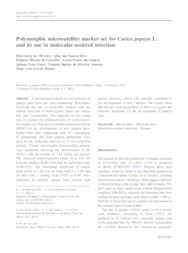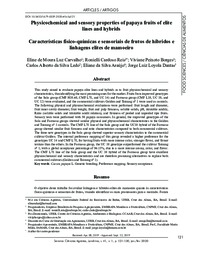Polymorphic microsatellite marker set for Carica papaya L. and its use in molecular-assisted selection.
Polymorphic microsatellite marker set for Carica papaya L. and its use in molecular-assisted selection.
Author(s): OLIVEIRA, E. J. de; SILVA, A. dos S.; CARVALHO, F. M. de; SANTOS, L. F. dos; COSTA, J. L.; AMORIM, V. B. de O.; DANTAS, J. L. L.
Summary: Conventional methods for the selection of papaya pure lines are time-consuming. Procedures involving the use of molecular markers and the indirect selection of homozygous plants can reduce this time considerably. The objective of this study was to evaluate the informativeness of a microsatellite marker set when used in marker-assisted selection (MAS) for the development of new papaya lines. Eighty-three lines originating from two segregating F3 populations and from papaya germplasm were used for the molecular analysis of 27 microsatellite primers. Twenty polymorphic microsatellite primers were identified, allowing the identification of 86 alleles, with an average of 3.18 alleles per primer. The observed heterozygosity values were low for both the markers (0.00?0.29) and the individual lines (0.00?0.35). The inbreeding coefficient (f) ranged from 0.634 to 1.00. Eleven lines with f = 1.00 and 18 lines with f varying from 0.953 to 0.961 were identified. In addition, papaya lines showed high genetic diversity, which will certainly contribute to the evelopment of new varieties. Our results show that the use of microsatellites in MAS is a quick and effective procedure for the development of papaya lines.
Publication year: 2010
Types of publication: Journal article
Unit: Embrapa Cassava & Fruits
Keywords: Microsatellites, Molecular-assisted selection, Papaya, inbred lines
Related content
Observation
Some of Embrapa's publications are published as ePub files. To read them, use or download one of the following free software options to your computer or mobile device. Android: Google Play Books; IOS: iBooks; Windows and Linux: Calibre.
Access other publications
Access the Agricultural Research Database (BDPA) to consult Embrapa's full library collection and records.
Visit Embrapa Bookstore to purchase books and other publications sold by Embrapa.


